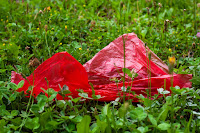Breaking Down Trash: Understanding Decomposition
Have you ever explored the woods or a riverbank and found an old glass bottle? As you take a closer look you realize you don’t see a bottle this shape in stores. With a closer look you see something stamped on it. Perhaps it’s a date? When it was made? When the contents expired? Either way, you know this is a very old bottle. You may wonder how it could have survived this long buried beneath the dirt and years of fallen leaves. What you may not know is if you hadn’t found that bottle, it could have stayed there untouched and unchanged for one million years! That’s right, glass can take at least one million years to break down in nature. Some experts even believe it will never break down and decompose.
Decomposition happens naturally over time due to a variety of factors from moisture levels to the amount of microorganisms present to temperature. The amount of time it takes for trash to break down is also highly dependent on the materials present. Tiny organisms in the soil munch on the material and break it down into smaller and smaller pieces until it becomes a part of the environment. In general, the softer the material the less time it takes to break down. Although glass may be the most extreme case of debris left by humans in our environment, you might be surprised at how long it takes other trash to break down.
Test Your Knowledge
Take a guess below at how long a piece of trash will take to break down! Highlight the green box under the item title with your cursor to reveal the answer:
 Plastic Bag
Plastic Bag20 Years
Disposable Diaper
450 Years

 Aluminum Can
Aluminum Can80-100 Years
Paper Towel
1 Year
1-5 Years
250 Years
How'd you do? Proper disposal of trash is so very important to the health of our natural world as chemicals leach out into our groundwater during the decomposition process or animals may mistake the trash for food and can become ill or die. We hope that as you spend time outdoors in your parks and neighborhoods that you will consider making sure that your trash ends up in the proper place rather than in the environment. Ensuring that trash ends up in a trash can or better yet is recycled is a great way to do your part and help make Durham a better place!
How'd you do? Proper disposal of trash is so very important to the health of our natural world as chemicals leach out into our groundwater during the decomposition process or animals may mistake the trash for food and can become ill or die. We hope that as you spend time outdoors in your parks and neighborhoods that you will consider making sure that your trash ends up in the proper place rather than in the environment. Ensuring that trash ends up in a trash can or better yet is recycled is a great way to do your part and help make Durham a better place!




Comments
Post a Comment